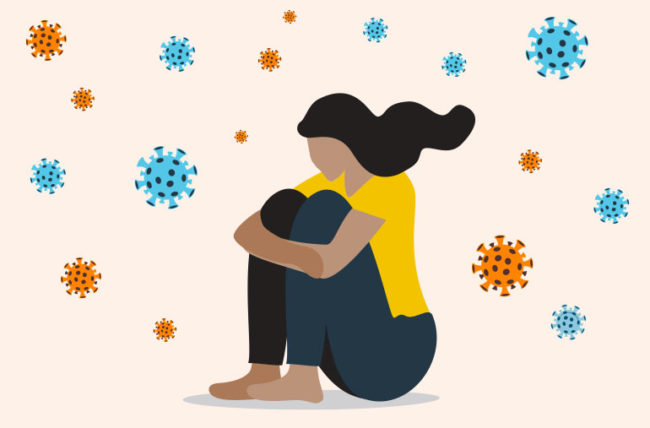Stressed? You bet, but experts have some top tips for coping with the Covid-19 crisis
By Mark Mahoney
As America and the global community continue to focus on addressing the continuing pandemic facing all of us, the issues related to mental health should not be forgotten. 
Obviously, the need for testing, isolation and rapid treatment are issues that are widespread in our societies at present. However, we do ourselves a disservice if we do not realize how anxiety and stress affect our overall mental health status as this unprecedented situation continues full speed.
The Public Broadcast Service’s NewsHour has published an insightful piece on why our mental health may be suffering from the COVID-19 pandemic. They asked experts for advice about how to manage the stress of life during the pandemic. Some of that content is highlighted in this column and some additional references are provided at the end of this column.
Although social distancing is recommended as the most effective tool the U.S. has to slow the spread of the novel coronavirus, the issue of social isolation and all the disruption caused in our daily lives has the real possibility of producing a toxic environment, particularly on those struggling with mental health issues.
Some of the most susceptible groups to stress during this crisis include: older people, those with chronic health conditions, children and teens, health care workers serving on the front lines of this virus and people grappling with mental health conditions

There’s a way to make this time more bearable and comfortable. One way of doing so is by keeping the lines of communication open with your family and friends.
How social distancing can hurt mental health
When you socially distance, you stay home and interact only with the people with whom you live. When you go outside, you stay at least 6 feet away at all times from anyone who doesn’t live in your household. You may not go to your place of employment. Your kids don’t go to school or you don’t visit your friends on the other side of town. You don’t eat at your favorite restaurant to celebrate special occasions. You postpone your family vacation.
It’s massively disruptive, and for many people, it has been intensely stressful.
No one knows how long this pandemic will last, or how long people’s lives will feel upended. Combined with the stress of job loss, mounting debt, household strains or even not being able to blow off steam at the gym, people may increasingly feel frustrated, bored, angry or confused, said Dr. Lynn Bufka, a psychologist and expert on stress and anxiety with the American Psychological Association.
“If you’re depressed, it’s hard to get the energy about how to do the things you need to do to stay connected to others,” Bufka said. “If you’re anxious, your anxiety is probably already elevated right now, and you have fewer resources to deal with that.”
A recent poll by PBS NewsHour, NPR and Marist notes that nearly a fifth of Americans said they have lost their job or had their work hours cut due to novel coronavirus. Social distancing can also be very lonely. Many older adults have grappled with solitude and loneliness long before COVID-19, as they are losing loved ones as they age. Nearly one out of three older Americans live alone and 43 percent of seniors say they feel lonely on a regular basis.
How stress may appear in adults
According to the Centers for Disease Control & Prevention (CDC) stress may manifest itself in adults in certain behaviors including:
- Feeling anxious about one’s health and that of their loved ones
- Disruptions in eating and sleeping
- Having trouble falling asleep or staying focused
- Aggravating pre-existing conditions
- Partaking in more alcohol, tobacco or drug use than under relatively normal circumstances
Stress and How it May Affect Kids
Social disruption can be very stressful for children, too. Losing the ability to follow a routine of going to school, learning with friends and teachers and playing on the playground can be distressing. Kids may express that frustration in many different of ways, depending on their age, including:
- Crying a lot or being very cranky
- Regressing in their behavior, such as bedwetting
- Being very worried or sad
- Adopting eating or sleeping habits that aren’t healthy
- Acting out (particularly among teenagers)
- Not performing well in classwork or avoiding all school demands
- Trouble staying focused
- Losing interest in activities they once enjoyed
- Headaches or body aches
- Using alcohol, tobacco or drugs
So, what actions can you take?
People in isolation should “stay connected and maintain your social networks,” along with your daily routine as much as possible, according to the World Health Organization. Maybe you can’t go to the office, but you can still take a shower, get dressed and stick to a general schedule.
You should also exercise, eat healthy food and sleep regularly, the WHO has urged, telling the public to “pay attention to your own needs and feelings” during these stressful times.
If you’re hearing about COVID-19 endlessly, that can cause more anxiety. Set times during the day to check in on developments, and pay attention to news and information from trusted sources to help you prepare and stay safe.
An interesting WebMD blog by Leslie Becker-Phelps, PhD titled, “How to Help Someone See Things Differently” may be helpful.
And even if you can’t be in direct physical contact with your best friend or your loved ones, technology makes it possible to make connections, and still appreciate the ups and downs of being human in these times.
Consider the following suggestions:
- Make a point of picking up the phone and checking on people. Commit to calling four people each day.
- Schoolchildren and some employees may be employing video conferencing or other technology-based platforms for communicating. Try applying these tools to staying in touch with friends. Consider viewing some favorite movies and or educational programs.
- Several museums have launched free virtual tours. You and a friend could schedule a time to “explore” a museum together while cooped up in your respective homes.
Despite social distancing, there are opportunities to deepen our relationships.
Thanks to PBS (and links to other national/international agencies and organizations) for much of the content contained in this column from their very informative article titled, “Why your mental health may be suffering in the COVID-19 pandemic,” (Public Broadcast Service March 19, 2020).Click here to read.
Additional Resources:
Check out the recent poll by PBS NewsHour, NPR and Marist: pbs.org
Nearly one out of three older Americans now lives alone. Check the following link from the Health Resources and Administration Services: hrsa.gov
Coronavirus may manifest itself in adults with certain behaviors. Check out the link from the CDC at cdc.gov
Mental health considerations during the Covi-19 outbreak are noted by the World Health Organization and can be viewed at www.who.int/docs.
_____________________________
Credit: Tallahassee Democrat
FYI: To provide our community with important public safety information, the

Mark Mahoney
Tallahassee Democrat is making stories related to the coronavirus free to read. To support important local journalism like this, please consider becoming a digital subscriber.
Mark A. Mahoney, Ph.D. has been a Registered Dietitian/Nutritionist for over 34 years and completed graduate studies in Nutrition & Public Health at Columbia University. He can be reached at marqos69@hotmail.com.






















